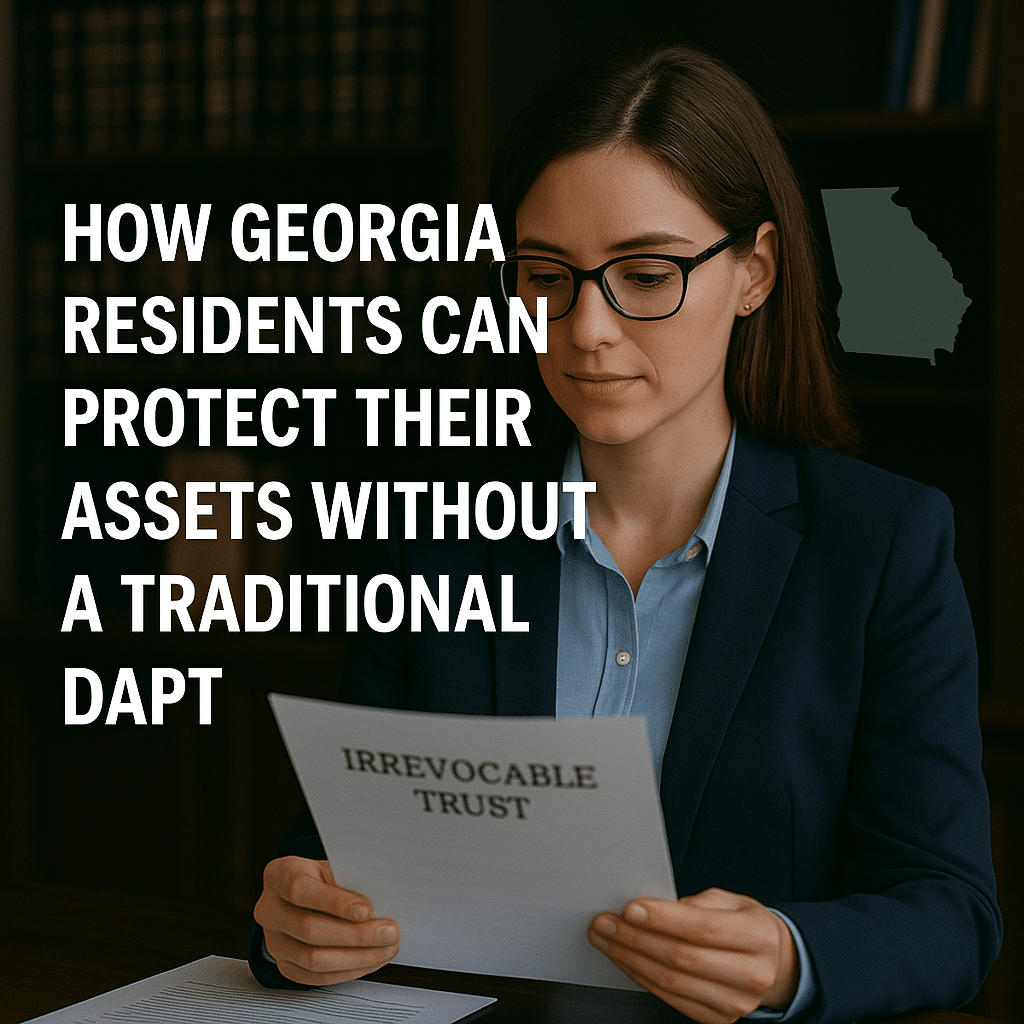Asset protection is a top concern for many Georgia residents—especially business owners, professionals, and individuals with significant savings or real estate. But Georgia is not one of the 20 states that allow Domestic Asset Protection Trusts (DAPTs). So what can you do?
The good news: You still have effective options. Even without a DAPT statute, there are legal strategies available to shield your wealth from creditors, lawsuits, and future risks.
Here’s how Georgia residents can protect their assets—without a traditional DAPT.
What Is a DAPT, and Why Doesn’t Georgia Allow Them?
A Domestic Asset Protection Trust (DAPT) is an irrevocable trust that allows the person creating it (the grantor) to also be a beneficiary, while still protecting the trust’s assets from creditors. States like Nevada, Delaware, and South Dakota allow DAPTs by law.
Georgia does not currently permit self-settled asset protection trusts, meaning:
- If you create a trust and keep a beneficial interest, it won’t protect those assets from your creditors under Georgia law.
- You cannot rely on Georgia courts to honor a DAPT created in another state if you live in Georgia and your assets are here.
So what are your alternatives?
1. Use a Third-Party Irrevocable Trust
If your goal is long-term protection, consider creating an irrevocable trust where you are not a beneficiary—but your spouse, children, or other loved ones are.
Benefits:
- Removes the assets from your estate
- Shields those assets from your creditors (and potentially theirs)
- Can be structured to retain control over how and when funds are distributed
This is especially useful for gifting strategies, life insurance, or planning for high-risk heirs.
2. Consider a Spousal Lifetime Access Trust (SLAT)
A SLAT is an irrevocable trust where one spouse gifts assets to a trust for the benefit of the other spouse and possibly children. The non-donor spouse can access the assets, allowing indirect access for the couple while still offering asset protection and estate tax benefits.
Best for:
- Married couples looking to protect assets while maintaining access
- Estate tax planning for high-net-worth families
- Preemptive planning before financial or legal problems arise
Note: This strategy requires careful coordination and should be set up well before any known creditor issues.
3. Use Legal Entities: LLCs and FLPs
For real estate, investments, or business holdings, Limited Liability Companies (LLCs) and Family Limited Partnerships (FLPs) can offer real-world asset protection.
Benefits:
- Personal creditors can’t seize the assets inside the entity
- May limit creditors to a charging order—a lien on distributions, not control
- Helps separate personal and business liabilities
Pair this with a trust for layered protection.
4. Umbrella Liability and Insurance Strategies
Sometimes, the first line of defense is insurance. No legal structure is bulletproof, but excess liability coverage (like an umbrella policy) can protect your assets from lawsuits related to:
- Car accidents
- Property liability
- Professional claims
Combine insurance with trust and entity planning for a stronger overall shield.
5. Prenuptial and Postnuptial Agreements
Family disputes are a leading cause of asset loss. A valid prenup or postnup can:
- Protect premarital or inherited property
- Define how assets are handled in a divorce
- Preserve family wealth across generations
In Georgia, these agreements are enforceable if done properly—make sure to consult an attorney to avoid future challenges.
6. Plan Proactively—Not Reactively
The worst time to protect your assets is when you’re already facing a lawsuit, debt collection, or divorce. Georgia law prohibits fraudulent transfers, so any effort to move or hide assets during a crisis can be undone—and potentially penalized.
The key to effective asset protection is early planning.
Let Hurban Law Help You Protect What You’ve Built
At Hurban Law, LLC, we help Georgia residents build smart, legal asset protection strategies that don’t rely on DAPTs. Whether you’re concerned about lawsuits, business risks, or preserving your legacy, we’ll tailor a plan that works—without crossing legal lines.
Contact us today to explore your options and protect your future.





